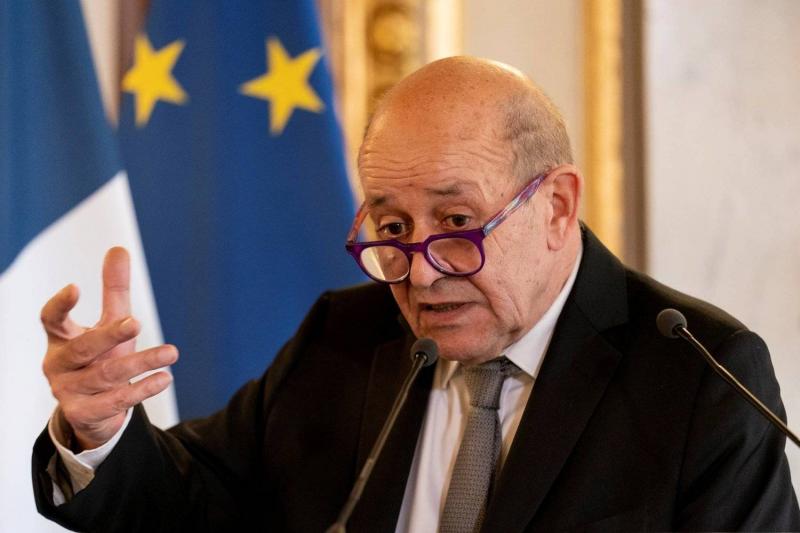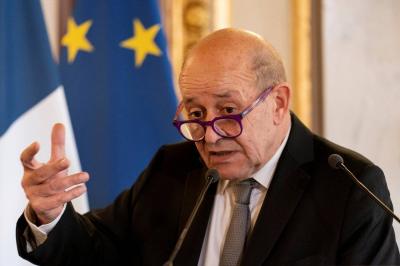The tense meeting yesterday between French presidential envoy Jean-Yves Le Drian and the head of the "Free Patriotic Movement," MP Jebran Bassil, revealed part of the true purpose of Le Drian's mission to Lebanon. He announced from the first day of his visit that he came representing the international and Arab quintet, presenting two main objectives for his mission: the implementation of Resolution 1701 and the extension of Army Commander General Joseph Aoun's term.
Le Drian's discussions on the second day included "Hezbollah," represented by the head of the "Loyalty to the Resistance" bloc, MP Mohammad Raad. The party issued a brief statement about the meeting. In contrast, Bassil seemed taken aback by Le Drian's proposal regarding General Aoun's extension, prompting him to immediately express his objections to the Army Commander, which shortened the duration of their meeting.
What is the overall summary of President Emmanuel Macron's envoy's visit? According to information from "Nidaa Al-Watan," it is now clear that Resolution 1701 is under international scrutiny, as evidenced by the direct or indirect messages reaching Lebanese officials, all urging the implementation of the resolution through the withdrawal of all armed manifestations in a 30-kilometer buffer zone.
However, this push, which is gradually turning into a campaign for international pressure, coincides with propositions previously brought to the Lebanese by American envoy Amos Hochstein, related to securing the land borders and Israel's withdrawal from the occupied areas in southern Lebanon.
In addition to his explicit call for the extension of the Army Commander, Le Drian's remarks about Resolution 1701 were striking, stating in front of some of those he met that it is the duty of the Lebanese authorities to implement the international resolution on their initiative; otherwise, it will be enforced by force.
In detail, it is clear from Le Drian's remarks that his focus revolves around three proposals: Lebanon must either implement the international resolution by ending armed presence within a 30-kilometer depth to create a buffer zone, or the international resolution will be amended to empower international forces more effectively in their military roles, or resort to Chapter VII to enforce implementation by force.
Diplomatic sources indicated that international pressure to implement the resolution has reached Lebanese officials from multiple international entities, not just from Le Drian, which is expected, especially since Israeli settlers in the north refuse to return home without security guarantees beginning with the withdrawal of armed manifestations south of the Litani River.
The sources reported that international pressure on Lebanon will intensify over time, primarily to reorganize the situation along the border, which is difficult to revert to its state before October 7, the date of Hamas's attack on the Gaza envelope. Therefore, they are gauging the Lebanese forces regarding securing the land borders following Israel's withdrawal from the occupied areas and the 13 disputed points, as well as halting the violations in exchange for removing military displays south of the Litani area.
The diplomatic sources pointed out that Paris is leading the official discussions regarding the international resolution, as it is the overseer of the resolution in the United Nations, referred to as the "penholder" in diplomatic terminology.
In a related context, prominent opposition circles stated to "Nidaa Al-Watan" that what Le Drian proposed regarding the presidency was "incidental;" the focus is on Resolution 1701, which is the priority and the core of the conflict. They noted that "Hezbollah" wants, at this stage, "to get past October 7 to maintain the current situation in Lebanon." They added: "What the party is doing is deliberate deception, claiming that one of the conditions of Resolution 1701 is to evacuate the towns in the south of their residents, which is untrue. What is demanded is the implementation of the resolution that the party signed in 2006 and which Secretary-General Hassan Nasrallah agreed upon. According to the resolution, there should be no armed presence other than the army and 'UNIFIL' in southern Litani."
The same circles concluded by stating, "Hezbollah wants to obtain a president by bringing its candidate Sleiman Frangieh to Baabda Palace, to give a promise to implement Resolution 1701, effectively issuing a bounced check, and returning to the situation that existed on October 6, while the current international reality moves towards an actual, not just formal, 1701 to legitimize the southern borders of Lebanon."
Shifting from the political scene to the field scene, the calm that has prevailed in the south since the ceasefire in Gaza last Friday was shaken yesterday. Reuters reported from "UNIFIL" that Israel "responded to fire from Lebanon across the border." This is the first time that international forces have issued such a statement since the outbreak of hostilities on October 8. Previously, they avoided detailing such incidents in their statements.
On the other hand, the U.S. embassy in Beirut tweeted on its account via the X platform: "We remain concerned about the potential extension of this conflict beyond." It added: "The full implementation of UN Security Council Resolution 1701 is a key element of this effort."




